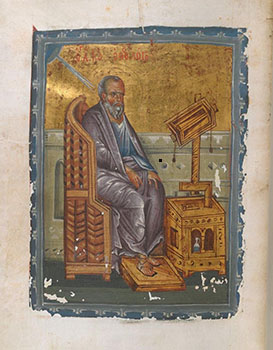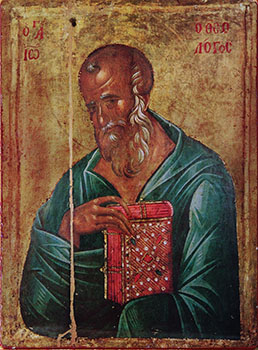"To Carry the Candle Against the Wind"
The New Commandment of Jesus
For Sunday April 28, 2013
Lectionary Readings (Revised Common Lectionary, Year C)
Acts 11:1–18
Psalm 148
Revelation 21:1–6
John 13:31–35
During Lent I watched a documentary film called A Place at the Table about hunger in America. We're the world's richest country and biggest food producer, and yet 14.5 percent of U.S. households — nearly 49 million Americans, including 16.2 million children — struggle to put food on the table. We have thousands of "food deserts" where it's virtually impossible to buy fresh produce. The number of food banks and soup kitchens has skyrocketed in the last few decades, which is just what many legislators want — let private charity solve this public problem while they shovel millions of tax dollars to corporate agribusiness.
After watching the film, my mind wandered across our country's cultural landscape.
 |
Apostle John from Greek minuscle 482, c. 1285. |
We have an epidemic of gun violence. Our broken health care system neglects the poor and enriches doctors, insurance companies, lobbyists, and Big Pharma.
Our government is dysfunctional. A proxy military made up of the poor supports a permanent war economy — America has 700 bases in 60 countries, and in any one year will conduct operations of some sort in 170 countries.
The mass incarceration rates of our penal system dwarf those of other developing countries, including Russia, China, and Iran. Over 20% of our children don't graduate from high school. The "entertainment" industry churns out a toxic combination of the vulgar and the vapid. And the economic collapse of 2008 showed just how much corporate capitalism privatizes its massive profits and socializes its risks.
These are signs of what Garry Wills calls a "deeply degraded culture." They're the stuff of dystopian movies like The Hunger Games, novels like The Road by Cormac McCarthy, and historical scholarship like Collapse by Jared Diamond. In his book called Vanished Kingdoms (2011), a history of "state death," Norman Davies argues that all political power is transient: "All states and nations, however great, bloom for a season and are replaced." To imagine that America is an exception is "whistling in the dark."
So, it's easy to be a pessimist. But here's the paradox — Christians are the ultimate optimists.
The epistle for this week explains why: "I am making all things new! These words are trustworthy and true." Christians are optimists because we believe that the God who created the world will redeem the world.
 |
John the Evangelist from Greek minuscle 1425, c. 12th-century. |
The gospel for this week shows how: "A new commandment I give you: Love one another. As I have loved you, so you must love one another. All people will know that you are my disciples if you love one another." God's redemption of the world is mediated through the love of his people.
When we love one another, the church becomes an exemplar of life out of death, a model of how the old can be renewed. We become a present-day sign of the future new heaven and earth, when God "will wipe every tear from their eyes. There will be no more death or mourning or crying or pain, for the old order of things has passed away."
It's not obvious in what sense Jesus's commandment is "new." It's an ancient commandment that goes back 3000 years to the founding of the Hebrew community: "Love your neighbor as yourself," says Leviticus 19:18. But that interesting technical question shouldn't distract us from the call of Jesus to love the world into a present reality of the future.
The reading from Acts about Peter and Cornelius is one example of how God makes the old new. Peter was a conscientious Jew who maintained his ritual purity: "I have never eaten anything impure or unclean." But in a vision he learned that even the Gentiles are accepted by God, and therefore he "should not call any man impure or unclean. If God gave them the same gift as he gave us when we believed in the Lord Jesus Christ, who was I to think that I could oppose God?"
In his commentary on Galatians 6:10, the church father Jerome describes how John the evangelist, author of the gospel and book of Revelation, preached at Ephesus into his nineties. Christian tradition holds that he died in about the year 100 CE.
John and his scribe Prokhorus, Russian icon, c. 1580. |
At that age, John was so feeble that he had to be carried into the church at Ephesus on a stretcher. Then, when he could no longer preach a normal sermon, he would lean up on one elbow. The only thing he said was, “Little children, love one another.” People would then carry him back out of the church.
This continued for weeks, says Jerome. And every week he repeated his one-sentence sermon: “Little children, love one another.”
Weary of the repetition, the congregation finally asked, "Master, why do you always say this?"
"Because," John replied, "it is the Lord's command, and if this only is done, it is enough."
The necessary connection between claiming to love God and demonstrating that we love our neighbor was so embedded in the early Christian traditions that we find this teaching repeated almost verbatim by Paul (Romans 13:8–9, Galatians 5:14), by James (James 2:8), and most memorably by John: "If anyone says, 'I love God,' yet hates his brother, he is a liar. For anyone who does not love his brother, whom he has seen, cannot love God, whom he has not seen. And he has given us this command: Whoever loves God must also love his brother" (1 John 4:20–21).
In his book of poetry called Leavings (2012), Wendell Berry's poem-prayer gives us a way to start:
"I know that I have life
only insofar as I have love.I have no love
except it come from Thee.Help me, please, to carry
this candle against the wind."
Image credits: (1) Wikipedia.org; (2) Wikipedia.org; and (3) Museum of Russian Icons.





